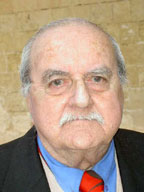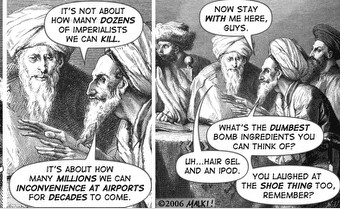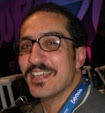An article I wrote about SUPA 2006 appeared in today's Malta Independent on Sunday magazine Manic. The magazine doesn't have a website so I'm reproducing my piece here.
* * * * * * * * *HIDING IN FULL VIEW
The Malta Arts Festival: Summer 2006 started on 28 July and runs until 20 August. One of the features of the festival is a series of events from the Summer University of Performing Arts (SUPA), originating from within the University of Malta. Toni Sant returns to Malta for a brief visit to present a Digital Live Art event along with a small group of collaborators at SUPA. Here he shares his exploration of the cultural relevance of such activities in Malta.
When I started to see where SUPA fits within the Malta Arts Festival: Summer 2006, festival artistic directors Mario Frendo and Davinia Galea told me they took particular care to put forward the widest possible spectrum of artistic activities possible. "This was done not only in the different mediums i.e. music, theatre, dance, etc., but also within the same artistic genre. Therefore musical activities range from the most popular crowd pulling events to the more specialized chamber music concerts. It is important for us as the Arts Council to reach out through quality. This surely does not rule out any events that normally do not attract huge audiences."
It is one of the objectives of the Malta Council for Culture and the Arts, to broaden and increase access to high quality arts and cultural events. "This ideal is reflected in this year's edition of the festival which includes also events of a particular nature which target specialized audiences including those who normally might not attend artistic events," the artistic directors told me, referring in particular to the production of Digital Live Art I'm involved in as part of the festival.
In Objects Lost or Found? (MITP Courtyard, Valletta - 5th&6th August at 9pm) we appropriate and manipulate objects found on the web, exploring the tradition of working with found objects and ready-mades in art first proposed by Marcel Duchamp almost 100 years ago. This new work explores what changes within the creative process in a digital media environment. You can read more about this event by going to the project website at www.foundorlost.com.
SUPA events are ideal for the Malta Arts Festival because they offer something which is not easily available elsewhere in Malta. SUPA events are also prestigious in attracting international collaborators that in turn attract international viewers. With Italian actors, Serbian dancers, French, Spanish and Irish performers, SUPA helps give a broader international dimension to the Arts Festival. The inclusion of SUPA events in the Malta Arts Festival also helps give the broader series of events a kind of 'fringe festival' within the festival, one that is integral in itself.
Besides the support SUPA receives from the Malta Council for Arts and Culture, through the inclusion of most of its performances in the Malta Arts Festival, it also benefits greatly from collaborative association with the University Cultural Cooperative, which manages the MITP theatre in Valletta. BOV is a SUPA founding sponsor and the workshops and masterclasses are supported by the Manoel Theatre, the National Orchestra, and the Music Studies Programme of the University of Malta. All these institutional supporters render SUPA into a fairly solid base from which to propose an arts programme that is not necessarily dependent on financial or popular success for its longevity.
Aside from the programme of events that people can attend throughout most of the month of August (even after the Malta Arts Festival is officially over) SUPA is the result of a process that has been going on for a couple of years without a name. Officially, SUPA came about in 2005 following a collaboration between the Icarus Project, a Maltese theatre group led by Frank Camilleri, and Mario Ruggeri's Milan-based CIRT (Centro Indipendente Ricerca Teatrale). Ruggeri and Camilleri met in Bulgaria at a theatre meeting in 2004 and immediately realised that their interests in theatre converged. Since that meeting, they have been collaborating on various fronts. SUPA is the main manifestation of this collaboration.
To better understand what goes on in what is arguably the most broad-reaching event in Malta's alternative theatre scene, I asked Dr Frank Camillieri to tell me more about SUPA. "Following the experience of the first edition of SUPA, it was quite natural for Mario and me to think up of an entity that could encompass the collaboration that has been developing since 2004. TARF - Theatre Arts Researching the Foundation - is the result of SUPA 2005." Camilleri says that "TARF is not so much a 'group' as a structure that allows Icarus and CIRT, as well as other theatre groups that are showing interest in what we do, to come together and share theatre knowledge in the praxis. The University of Malta's Theatre Studies Division is the key link that binds all these structures together. First of all it gives us the possibility of speaking of a 'Summer University' (rather than a Summer School); secondly, the research conducted within SUPA and TARF is central to the PAR (practice as research) dimension that Theatre Studies is aiming to boost in it next stage of development." Incidentally, this is in line with the PAR element that is currently being strongly developed in most Theatre and Performance departments in universities around Europe.
Fearing that this Manic article would only appeal to a fairly narrow audience if I kept it at an academic level, I asked my colleague Frank a very practical question, which is actually much more complex than the sort of thing we have space for here. It's a question I ask myself quite often: why should we still bother with research theatre in the 21st century when theatre arts have changed so much over the last 100 odd years?
His response gives me even more food for thought. He says: "...because not all human beings are consumers all the time...because it is different ... because when it is good, research/physical/contemporary/call-it-what-you-will theate is very entertaining in a way that a McDonald's burger can never be."
Frank Camilleri has personally been engaged in this type of work for close to two decades. Of course, we can trace it all the way to the 1960s, but according to Camilleri, "it is in the 1990s that I perceive a quasi-scientific (definitely academic, in the positive sense) interest in the performer's work and in the art/process of putting up a performance."
In Malta, the work evolved as it always does: thanks to individuals and/or individual groups. The availability of the MITP space from the early 1990s has certainly boosted the interest in this field and the individuals/groups who worked or work at the MITP can be considered to be the main proponents in this line of theatre, diverse as it is. The names most associated with all this are those of John Schranz (with whom Frank Camilleri worked closely for 14 years), Immanuel Mifsud, Aleateia Theatre Group, and Theatre Anon. In most cases, for an impact to be made, activities need to span years. In this way, and only in this way, can theatre practitioners build a legacy for themselves, which strengthens their work over the years.
Currently there are a number of interesting 'alternative theatre' groups/individuals that might develop into something exciting ... but let us wait for a couple of years before we assess their impact. Another point concerning the Malta experience of research theatre is the inclusion of so-called 'physical theatre' classes in drama schools. These classes are contributing to a commodification of what could be 'packaged' as 'research theatre'. The effect of this commodification can be felt in some 'alternative' and 'physical theatre' performances that have been put up in the past 4 years or so.
There's much more to SUPA that what you would get if you simply followed the work of Frank Camilleri and his direct collaborators in Icarus. I would go as far as saying that work by Maltese artists can be appreciated even more when presented in the context of an International festival in Malta.
As Dr Camilleri explains, "the tools that SUPA employs are the tools of practice: of technique and experience. Sometimes these tools are brought to bear on one aspect of the work (for instance, on the physical work of the performer), at other times the emphasis could be an aspect of the voice or even an exploration of spatial dynamics or of montage procedures. So there are various points of entry. Though this might give the impression that we are dissecting and fragmenting the performative experience (and this is one of the cardinal sins committed in the commodified 'physical theatre' sessions mentioned earlier), our objective is always the attainment of an organic way of performative behaviour.
"Yes, in order to obtain organicity, a performer often needs to fragment the way he or she works. This is where technique is useful: because it is not the end in itself but a means, a bridge, to an end. Having said that, I am aware of the danger that some practitioners fall for when technique becomes the performance. A visiting professor we had this year at Theatre Studies called this phenomenon the 'fetishisation of technique' i.e. when technique replaces the thing that it is supposed to bolster. This discussion is part of what produces the aesthetics, hence the art, of this kind of theatre work. This aesthetic, in turn, connects with the viewers who see the work ... and that's where the entertainment comes in. I can quote what Roland Barthes says about the pleasure of the text, how there is pleasure in passively consuming something, but that there is then a kind of pleasure that makes of the viewer a co-creator, but that is a long story ..."
The idea of collaboration, interaction, and exchange are central in many contemporary performance works. It is therefore not surprising that SUPA includes a couple of events that are listed as 'exchanges of work'.
Although these type of encounters aren't new in the art world, the term 'work exchange' is a relatively new term. Within a theatre environment, Frank Camilleri explains it as an encounter between two or three theatre realities that work together and share their experiences. The aim of a 'work exchange' is not necessarily to 'teach' or to 'transmit' a particular technique. It is, rather, a space for practitioners to show and share their work with other practitioners." A 'workshop', on the other hand, is essentially a pedagogical experience where the leader transmits his or her craft to a group of individuals.
This year's SUPA includes two work exchanges: one between Icarus and CIRT (this is an ongoing project that allows a particular kind of praxis research to happen over a number of years) and another that includes a Dublin-based group called nervousystem.
Seeing the richness of this alternative festival within the Malta Arts Festival, I asked Frank about future plans for SUPA. His response is clearly on of someone who has his feet firmly planted on the ground. "That way," he assures me, "you have a better chance of, one day, learning to fly."
As he sees it, the development of the SUPA research paradigm is not about 'doing more things', so it is not a question of extending the programme. "I feel that the current research paradigm (performances-workshops-works exchanges-conferences) needs to be explored for a couple of years. Last year was dedicated to 'Theatre Craft'. This year we are trying to explore links between theatre and music. My dream is to have SUPA editions dedicated to the interstices that exist between theatre and the other performing arts. For instance, a SUPA between dance and theatre; music and theatre; digital live art and/or performance and technology; theatre and installations ... I feel that this is the way forward. I also feel that it is the experience itself that will guide the way."
The full programme of the Malta Arts Festival is available at www.maltaculture.com. For a full programme of SUPA events see www.tarf.info.
 Pawlu Karaċi, as we affectionately knew him, died last night. He was 80. I had not heard much of him since I left Xandir Malta in the early 1990s. I was not really aware that he was an elected member of the Balzan local council until last year when the Institute of Maltese Journalists gave him the Gold Award.
Pawlu Karaċi, as we affectionately knew him, died last night. He was 80. I had not heard much of him since I left Xandir Malta in the early 1990s. I was not really aware that he was an elected member of the Balzan local council until last year when the Institute of Maltese Journalists gave him the Gold Award. 


















